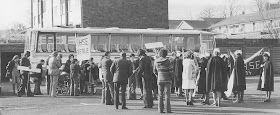
JOIN THE
FRENCH RESISTANCE
Thousands of French Nursing Students, members of UNISON’S sister union the CGT have been staging demonstrations in Paris over their poor treatment.
In November Nursing Students had been asked to work in army run swine flu vaccine centres on a voluntary basis but the Government then introduced draconian laws to force Nursing Student to work in centres.
This lead to the spectre of Nursing Students being woken from their beds by the police, to be escorted to work to ensure they did not abscond.
The CGT complained that Nursing Students had received little or no training and the centres were operating in a totally chaotic basis, where bullying was rife.
Nursing Students were being forced to work 14 hours a day, (8am –10pm) seven days a week with few breaks. They even have to pay for their own transport to the army run centres.
The initial result from the CGT nursing students campaign has been that the Conservative French Health Minister, Roselyne Bachelot, has been forced to issue advice stating that Nursing Students cannot be “requisitioned” for more than ten hours a week, the CGT has also won better pay for Nursing Students.
UNISON Nursing Students have an equally proud record, having defeated attempts to make them work millennium eve/day, we stopped the introduction of payments for uniforms and we are also the only union to fight for a wage and employment rights for Nursing Students.
Nursing Students are demanding “Dignity and Respect”. You can join the UNISON Nursing Student e-mail network by contacting your local UNISON Representative stating your name/University or UNISON Direct 0845 355 0845













